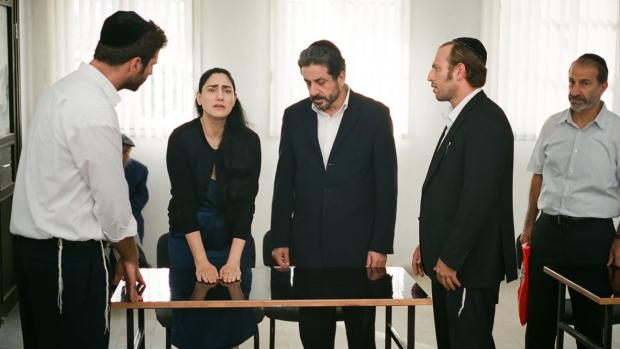The 31st Buffalo International Jewish Film Festival
The 31st edition of the Buffalo International Jewish Film Festival opens today at the Amherst Theater. Through the coming week it will feature 10 critically acclaimed films (each shown on two different days) from around the world. Among the highlights:
Gett: The Trial of Viviane Amsalem is a fascinating drama about an Israeli woman’s attempts to get a divorce. Until very recently, civil marriage did not exist in Israel. You could marry under the auspices of your religious authority, or you could apply for a “couplehood union.” By the same token, divorces in Israel can only be granted by religious authorities. Jewish marriages can be dissolved only if the husband agrees to a divorce; if not, the woman is considered a “chained woman.”
Viviane Amsalem (Ronit Elkabetz) is a woman seeking a “gett,” a writ of divorce from her husband Elisha (Simon Abkarian). When she first applies she has lived apart from him for three years, after 30 years of marriage. There is no question in her mind that they are incompatible and that she has no wish to live with him. She has been living with her siblings, and as the owner of a beauty parlor she is self-supporting. To our eyes, there is no reason not to grant the divorce.
But the trio of rabbis to whom she must plead her case see only that her husband will not give her the gett. There is no adultery, he hasn’t beaten her: what’s the problem?
Gett takes place entirely inside the room where Viviane argues, with the help of her advocate Carmel (Menashe Noy). It is essentially a courtroom drama, though technically it is not a court: the rules are vague but unbending. And Viviane has to struggle every step of the way, even to get her husband to show up. If he doesn’t, the rabbis argue that they have no way to compel him other than to set another hearing in a few months.
As the months turn into years, the trial becomes a Kafkaesque absurdity. The film has elements of humor, especially in the testimony of some of the witnesses Viviane calls.
Gett is the final in a trilogy of films about this couple written and directed by Ronit and Shlomi Elkabetz, though it’s not necessary to have seen the others: cunningly directed and well acted, it’s a wholly rewarding film on its own.
The Sunday 3pm screening will be followed by a panel discussion with three local rabbis about the state of marriage laws for Jews in Israel. You can also see Gett Tuesday at 8pm.
Divorce for Jews in North American isn’t without its problems, as shown in the Canadian feature Felix and Meira, which was voted best Canadian feature at the Toronto International Film Festival. Set mostly in Montreal during the snowy season, the film charts the growth of a relationship between two disaffected people. Meira (Hadas Yaron) is a young wife and mother in the city’s Hassidic community. She is loved by her husband Shulem (Luzer Twersky), who tries to give her as much leeway as he can within the boundaries of his beliefs. But it’s getting difficult: neighbors and families are starting to wonder why they only have one child, a three year old daughter, when “six, eight, even 14” are expected.
When she meets Felix (Martin Dubreuil) in a kosher pizzeria (that’s Montreal for you), the story takes a path that is not surprising. What makes the film engaging is the route it takes to get there. Director Maxime Giroux realizes that our expectations of the story save him the trouble of having to spin it out. Instead, he focuses on unexpected details, largely in the environments where the characters interact (aside from Montreal, a portion is set in Brooklyn, where Meira has been sent for a punishment that instead amplifies her interest in the outside world.) This approach—visual over characters and dialogue—is what distinguishes cinema over television, where the small screen is less able to hold our attention. Its delicate presentation is a quality that is becoming increasingly rare. Sun 8 pm, Weds 3:30pm.
When Deli Man was last shown here, The Public contributor George Sax called it “a nostalgic celebration of a once-ubiquitous urban culinary institution in America: The Jewish Delicatessen. Erik Greenberg Anjou’s spirited but occasionally poignant documentary examines these distinctive restaurants which have offered a rich, if unpretentious, gastronomic experience for well over a century in America’s larger cities, although, as the movie makes clear, now in greatly diminished numbers.” It will be shown on Saturday as part of the opening party, which includes a deli dinner and wine at 6:30pm. If you just want to see the movie, it starts at 7:30pm; you can also catch it Tuesday at 3:30pm.
Other features include:
A La Vie (To Life, France, Jean-Jacques Zilbermann) Fri 3:30pm, Mon 8pm
Dough (UK, John Goldschmidt) Sun 1 pm, Thurs 3:30pm
The Last Mentsch (Germany, Pierre Henry Salfati) Sun 6pm, Thurs 1pm
Hunting Elephants (Israel, Reshef Levy) Mon 3:30pm, Weds 8pm
Karski And The Lords Of Humanity (Poland, Slawomir Gurnberg) Mon 1pm, Weds 6pm
In Silence (V Tichu, Slovakia, Czech Republic, Zdenek Jirask) Mon 6pm, Thurs 6pm
Once In A Lifetime (Les Heritiers, France, Marie-Castille Mention-Schaar), Tues 6pm, Thurs8 pm
Full information including trailers and a schedule are available at bijff.com

